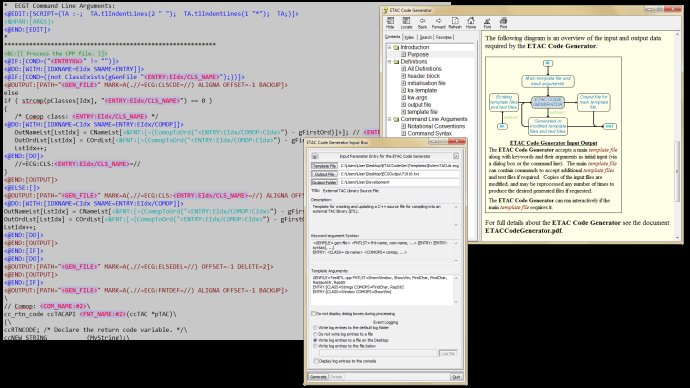The ETAC Code Generator is a powerful software tool that generates text and source code based on templates. It uses a unique declarative template language that can be extended using ETAC programming language scripts.

The user simply specifies a template file and input arguments, either on the command line or in the input dialog box. A template file is written in ECGL, a unique advanced declarative template language, containing special descriptive codes in the form of keywords and their arguments, intermixed with special symbols and the text to be generated.
During the processing of a template file, the special symbols are replaced by the corresponding input arguments, which can be modified as per your requirements. ECGL also incorporates the ability to use the procedural language ETAC for producing specialised output where necessary.
ECGL can read and maintain existing or generated text and template files as part of its processing, making it suitable for updating code fragments of computer program source files. The ETAC scripts in a template file can utilise the full power of the ETAC programming language and communicate with the ETAC Code Generator via ETAC functions to access and modify various properties of the components of a template file, such as the values of special symbols.
The ETAC script utilises ETAC's interactive debugger for visually tracing the activation of script tokens when running in debug mode. The ETAC Code Generator package comes with off-line detailed documentation along with ten template files and the full source code, which is available via the Run ETAC Scripts package. There is no internet connection required for operation.
Overall, the ETAC Code Generator is a must-have for any software developer who wants to save time and improve productivity. Its advanced features, along with a comprehensive documentation package, make it an invaluable tool for generating and maintaining source code and other text files.
Version 2-0-3-ena: The ETAC code generator now has basic support for the full Unicode codespace (U+0000 to U+10FFFF). Data files can be written in UTF-8, UTF-16, UTF-32, Windows-1252.